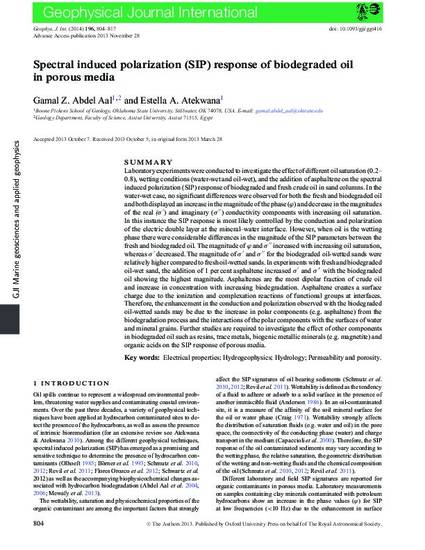
Laboratory experiments were conducted to investigate the effect of different oil saturation (0.2- 0.8), wetting conditions (water-wet and oil-wet), and the addition of asphaltene on the spectral induced polarization (SIP) response of biodegraded and fresh crude oil in sand columns. In the water-wet case, no significant differences were observed for both the fresh and biodegraded oil and both displayed an increase in the magnitude of the phase (φ) and decrease in the magnitudes of the real (σ′) and imaginary (σ″) conductivity components with increasing oil saturation. In this instance the SIP response is most likely controlled by the conduction and polarization of the electric double layer at the mineral-water interface. However, when oil is the wetting phase there were considerable differences in the magnitude of the SIP parameters between the fresh and biodegraded oil. The magnitude of φ and σ″ increased with increasing oil saturation, whereas σ′ decreased. The magnitude of σ′ and σ″ for the biodegraded oil-wetted sands were relatively higher compared to fresh oil-wetted sands. In experiments with fresh and biodegraded oil-wet sand, the addition of 1 per cent asphaltene increased σ′ and σ″ with the biodegraded oil showing the highest magnitude. Asphaltenes are the most dipolar fraction of crude oil and increase in concentration with increasing biodegradation. Asphaltene creates a surface charge due to the ionization and complexation reactions of functional groups at interfaces. Therefore, the enhancement in the conduction and polarization observed with the biodegraded oil-wetted sands may be due to the increase in polar components (e.g. asphaltene) from the biodegradation process and the interactions of the polar components with the surfaces of water and mineral grains. Further studies are required to investigate the effect of other components in biodegraded oil such as resins, trace metals, biogenic metallic minerals (e.g. magnetite) and organic acids on the SIP response of porous media.
- Biodegradation Process,
- Complexation Reaction,
- Electric Double Layer,
- Hydrogeophysics,
- Mineral-water Interface,
- Permeability And Porosities,
- Spectral Induced Polarization,
- Wetting Conditions,
- Asphaltenes,
- Biodegradation,
- Complexation,
- Crude Oil,
- Electric Properties,
- Functional Groups,
- Hydrology,
- Microbiology,
- Polarization,
- Porous Materials,
- Sand,
- Wetting,
- Biodegradable Polymers,
- Asphaltene,
- Electrical Property,
- Permeability,
- Porosity,
- Porous Medium,
- Spectral Analysis,
- Electrical Properties,
- Permeability And Porosity
Available at: http://works.bepress.com/estella-atekwana/81/